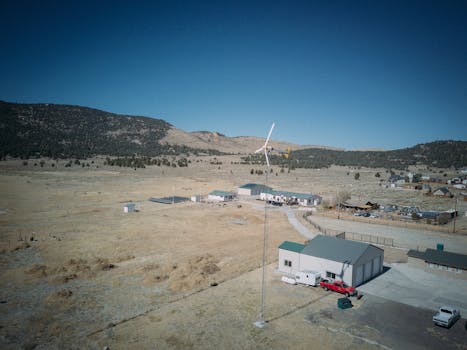happpy.news is an open source project, made with ♥ by reuben armstrong
and powered by this advert ^ from charity.marketing
In Kenya's arid regions, solar-powered water farms are providing clean, safe water to over 300,000 people improving health and economic outcomes.

In the heart of Kenya's arid regions, where water scarcity has long plagued communities, an innovative solution is changing lives. Solar-powered water farms are revolutionizing access to clean and safe water, positively impacting the health and economic well-being of over 300,000 people. This initiative not only addresses the immediate need for water but also fosters long-term sustainability in these vulnerable areas.
Water scarcity is a significant issue in many parts of Kenya, particularly in the northern and eastern regions, where rainfall is scarce and unpredictable. Traditional water sources are often contaminated, leading to waterborne diseases that disproportionately affect children and vulnerable populations. The introduction of solar-powered water farms is a game-changer, utilizing renewable energy to extract clean water from underground aquifers.
These innovative farms harness the power of the sun, using solar panels to pump water from deep underground. The process is environmentally friendly and cost-effective, minimizing reliance on fossil fuels. This approach not only ensures a consistent supply of clean water but also reduces operational costs, making it an attractive solution for communities with limited resources. As a result, these water farms are becoming increasingly popular, with more communities seeking to implement similar systems.
Health outcomes have notably improved in areas where these solar-powered farms have been established. Access to clean water reduces the prevalence of waterborne diseases, which are a significant burden on Kenya's healthcare system. According to the World Health Organization, improved access to safe drinking water can reduce the risk of diseases such as cholera and dysentery. With fewer health issues, families can focus on their livelihoods, leading to enhanced productivity and economic stability.
In addition to health benefits, solar-powered water farms are creating economic opportunities. The availability of clean water supports agriculture, allowing communities to grow crops and rear livestock more effectively. This not only improves food security but also provides income-generating opportunities for families. As communities become more self-sufficient, they can invest in education, healthcare, and other essential services, further enhancing their quality of life.
The success of solar-powered water farms in Kenya has garnered attention from various stakeholders, including government agencies, non-governmental organizations, and private investors. Collaborative efforts are underway to scale this model and reach even more communities in need. These partnerships are crucial in ensuring that the benefits of clean water extend beyond isolated projects and create a lasting impact on a national level.
As the world increasingly recognizes the importance of sustainable development, initiatives like Kenya's solar-powered water farms serve as a beacon of hope. They demonstrate that with innovative solutions and community engagement, it is possible to tackle pressing challenges such as water scarcity and health disparities.
In conclusion, the successful implementation of solar-powered water farms in Kenya is a testament to human ingenuity and resilience. By providing clean water to thousands, these farms are not only addressing immediate needs but also paving the way for a healthier and more prosperous future. As more communities adopt this sustainable approach, the vision of a world where everyone has access to clean water becomes increasingly attainable.
Source: The Guardian